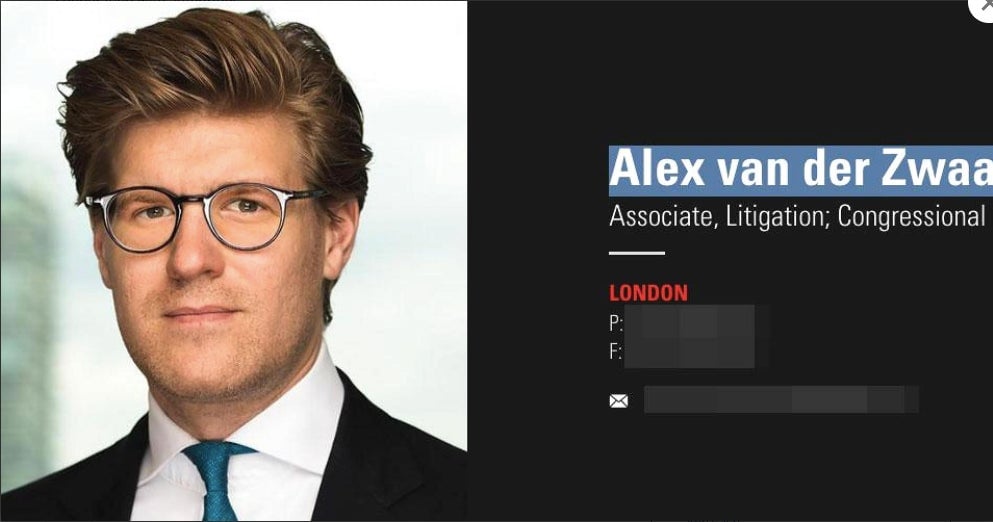Inside “reputation laundering” and the controversial report at the heart of Mueller’s latest indictment
The latest Russia investigation indictment shines a light on a little-discussed sector of the global economy: the US and British companies that help foreign kleptocrats clean up their images. The practice is so pervasive that in anti-corruption circles, it’s been dubbed “reputation laundering.”


The latest Russia investigation indictment shines a light on a little-discussed sector of the global economy: the US and British companies that help foreign kleptocrats clean up their images. The practice is so pervasive that in anti-corruption circles, it’s been dubbed “reputation laundering.”
Special counsel Robert Mueller today indicted (pdf) the Dutch lawyer Alex Van Der Zwaan with charges of lying to federal prosecutors and deleting evidence of his contact with top Trump campaign staffer Rick Gates and an unnamed “Person A.” The three were allegedly in touch about a report on the controversial trial of former Ukrainian prime minister Yulia Timoshenko. The report was authored by top New York law firm Skadden Arps, where Van Der Zwaan worked at the time.
Gates and Paul Manafort contracted Skadden in 2012 while working as spin doctors for then-Ukrainian president Viktor Yanukovych’s government. Yanukovych, who fled the country in 2014, has been accused of extraordinary corruption while in office and had locked up rival Timoshenko on charges widely considered to be false. Skadden’s report that year largely supported the charges against her. Manafort then hired the Podesta Group and Mercury Communications to lobby US officials to support Yanukovych, using the report.
The report’s credibility has been attacked by former US ambassador to Ukraine John Herbst, who told the New York Times (paywall) the report was “a nasty piece of work” and that Skadden “should have been ashamed of it.” Other New York Times sources said that even Podesta and Mercury employees thought the report was a “whitewash.” Skadden insists the report was accurate.
As Quartz has reported in a previous investigation, elites from the former Soviet Union have been known to make use of Western law firms, PR companies, and corporate intelligence firms to lobby on their behalf, produce documents whitewashing them, and investigate their enemies. If accusations that Skadden deliberately whitewashed the report to put Yanukovych in a good light are true, it would seem a classic case of reputation laundering. (Reputation laundering is not a crime in itself, and there is no suggestion that Skadden did anything illegal.)
Van Der Zwaan is the son-in-law of Russian-Ukrainian oligarch German Khan, a co-owner of the Kremlin-linked private bank Alfa Group.
Gates and Manafort would go on to become part of the Trump campaign. Both have been indicted by special counsel Robert Mueller on charges including “a conspiracy against the United States,” in the course of his investigation into Russian election meddling. The alleged misdeeds have not been linked to the 2016 campaign, however.
Ukrainian authorities have also been probing the Skadden report and the way it was paid, as part of a corruption investigation into Yanukovych’s government, the New York Times reports (paywall). Van Der Zwaan, who worked out of the firm’s London office, is reportedly one of eight Skadden lawyers the Ukrainians have linked to the report. Former Obama White House counsel Greg Craig and fellow ex-Obama official Clifford Sloan were also linked to the report. Skadden didn’t respond to a request for comment on this story, but it told the New York Times it fired Van Der Zwaan last year and is cooperating with law enforcement on the case.
Ukraine’s investigators have alleged that Yanukovych’s government evaded Ukrainian public contracting rules by only paying Skadden $12,000 for the report—just below the threshold that would require a public bidding process—and then paying the firm $1.1 million a year later, with Skadden apparently having done no more work for Ukraine.
This isn’t Skadden’s only work for powerful Ukrainians. The firm represented Gennady Bogolyubov in his London high court battle against fellow oligarch Viktor Pinchuk, which was eventually settled out of court.